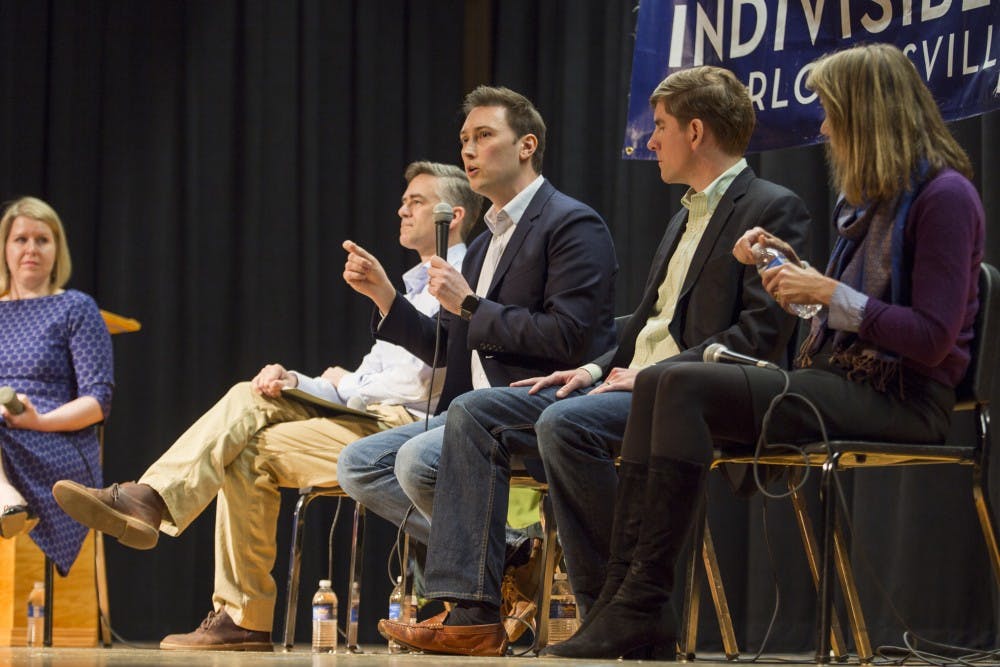Four qualified candidates, Leslie Cockburn, Ben Cullop, R.D. Huffstetler and Andrew Sneathern, are currently vying for the Democratic nomination for the 5th Congressional District election, each with a unique platform, personality and career path. That each of these individuals pose a potential challenge to Rep. Tom Garrett (R-Va.) in November speaks to their strengths and the fortitude of the Democratic Party here in the 5th District. But a choice must be made, and University students must seize the opportunity to determine the eventual candidate.
By participating in the Charlottesville City and Albemarle County caucuses en masse, we young voters can send a signal to the 5th District that our perspectives must be taken into account. We are a significant portion of the constituency of the 5th District, and participation in the caucus process is an important way to make sure students’ priorities are reflected by the Democratic candidate.
Individual votes matter, particularly in a caucus setting. While everyone’s vote certainly carries influence in any election — see Virginia’s own experience with that last November — this is even truer in a caucus in which delegate allocation depends on a handful of votes. Due to the voting rules and intimate nature of local caucuses, it is likely that individual votes could be a deciding factor in increasing a particular candidate’s delegate count as they head to the May 5 district-wide convention.
In the Charlottesville City Caucus, for instance, 19 delegates will be elected proportionally and then go on to represent one of the four individual candidates at the convention. Regarding turnout, several hundred caucus-goers are expected to attend. With so few people electing 19 delegates, each participant clearly wields a significant amount of voting power. In addition, since there is the opportunity to persuade others to support a particular candidate, participants’ influence can extend beyond their individual votes.
Additionally, caucuses always promise to be exciting political experiences. The event will entail speeches and intense debate about the individual candidates and their platforms, which makes the caucus a great opportunity for students to actively articulate their own ideas, speak on behalf of the University community and groups they identify with and learn new perspectives. Participants are bound to meet fellow engaged citizens in the Charlottesville community and experience an atmosphere of enthusiasm. Much like the Iowa caucuses that catalyze excitement in every presidential cycle — the Charlottesville and Albemarle caucuses have the potential to shape the contours of the race and hint toward the final results.
Some believe the 5th District is unwinnable, arguing that the district is so rural, white and historically Republican that Democrats should not focus our energy on the race. The results of a special election in Pennsylvania’s 18th Congressional district that took place this March, however, cast doubt on that reasoning. In that race, Democrats won a district that President Donald Trump won by nearly 20 points, indicating a very strong national environment for Democratic candidates. Given that President Trump won the 5th District by a comparatively small 11 points, there is no reason Democrats could not be victorious this year. This potential makes it that much more important to get involved in the election process early by showing up to caucus. Greater participation means Democrats can elect a candidate that better reflects the political preferences of the district — setting the party up for success this November.
Students can learn how to get involved in the caucus process in several ways. Firstly, we encourage everyone to check out this caucus-explainer, which provides a good summary of the process. Secondly, we highly recommend the University Democrats’ “Caucus & Convention Crash Course,” in early April. At this event, UDems and two members of the Albemarle Democratic Party will explain the ins-and-outs of the caucus proceedings and answer any questions students may have about the process. As for transportation to the caucus, UDems is working on providing rides to students on the day of the caucuses, with more details being released about this soon. All in all, taking advantage of these resources will help prepare students to participate in the caucuses and help them feel ready to make their voices heard. If students want to see our priorities recognized and have a more progressive and responsive representative, caucusing is absolutely imperative.
The University Democrats are a Contracted Independent Organization at the University of Virginia. They can be reached at democrats@virginia.edu.








